Dr Pegine Walrad
Senior Lecturer in Molecular Parasitology
Visit Dr Pegine Walrad's profile on the York Research Database to:
- See a full list of publications
- Browse activities and projects
- Explore connections, collaborators, related work and more
Profile
Biography
Dr Pegine Walrad is a Medical Research Council-funded Senior Lecturer (Associate Professor) in the York Biomedical Research Institute (YBRI) at the University of York and a global research leader in gene regulation and infectious disease. The Walrad lab investigates parasite genetics, cell biology and host:parasite interactions; with a focus upon RNA binding proteins in Kinteoplastid parasites that cause neglected tropical disease. She characterized conserved protein domains and isolated interacting partners of the transcription factor Runt (Runx), discovered the first trans-regulator of surface proteins and an essential, novel pathway of mRNA export in Trypanosomes that cause Sleeping Sickness (Walrad et al, MBC, 2010, 2011, Walrad et al. PLoS Pathogens, 2009, Walrad et al. NAR, 2012, Bühlmann et al. NAR, 2015). Parasite gene regulatory networks are divergent from humans and represent an untapped weakness to explore novel combative strategies and streamline diagnostics.
The Walrad lab has quantitatively identified the mRNA binding and whole cell proteomes of L. mexicana, identified key RBPs essential to mammalian infection, uncovered epigenetic regulation of Leishmania virulence by methylation of RNA binding protein (RBP) regulators (novel eukaryotic post-transcriptional epigenetics) and quantitatively defined motility dynamics of Leishmania and chemotaxis in human-infectious forms (Pablos et al. MCP, 2019, Parry, Teles et al. unpublished, Ferreira et al. NAR, 2020, Findlay et al. eLife, 2021).
Her research focuses on molecular pathways of the parasite lifecycle progression to human-infectious forms employing a range of multidisciplinary tools and approaches including molecular genetics, microfluidics, structural biophysics, bioinformatics and mathematical modeling of developmental events and transmission potential. Recent collaborations isolated a novel RBP master regulator of T.brucei differentiation in the tsetse fly, quantitatively identified the comprehensive RNA binding proteome of T. cruzi, verified and characterised novel ncRNA function in L.major and L.braziliensis and developed a mathematical model of L.mexicana transmission by sandflies (Casas-Sanchez et al. unpublished, Viraque et al. unpublished, Espada et al. unpublished, Quilles et al. unpublished, Teles et al. unpublished, Carmichael et al. PLoS NTD, 2021).The Walrad lab collaborates with multiple international consortiums (NTD Network, LeishPathNet, JCPiL, Leish@York) and is supported by the UK Medical Research Council, FAPESP, CNPq (Science without Borders), Royal Society, and Horizon Europe’s Global Health EDCTP3.
A strong advocate for EDI, she is Athena Swan lead for the Department of Biology at York, England’s 1st Gold Award recipient. She officially mentors a full range of career researchers, from undergraduates to junior academics. She is Protozoan Subject Editor for Parasites and Vectors journal. She has Co-chaired and been the Main Organiser of Europe’s foremost international conference in Parasitology (2021, 2022), expanding its reach through hybrid delivery, elevating York’s visibility as a leading global hub. In 2021 as EDI advisor for the British Society for Parasitology’s Executive Council, Dr. Walrad initiated, realised and established obligatory free childcare, ECR career and Diversity and Inclusion sessions at all international BSP meetings. During her tenure global membership expanded from ~20 countries to 53.
Research
Projects
Walrad lab at RNA UK 2024

From left to right: Carol Ricce Espada, Pegine Walrad, Natalia Teles, Jia Zhuo.
The Walrad lab investigates parasite genetics, cell biology and host:parasite interactions; with a focus upon RNA binding proteins in Leishmania parasites. She isolated and characterised the first trans-regulator of surface proteins and a novel pathway of mRNA export in Trypanosomes that cause Sleeping Sickness and co-developed a mathematical model of Leishmania transmission by sandflies (Walrad et al. 2009, Bühlmann et al. 2015, Carmichael et al. 2021).
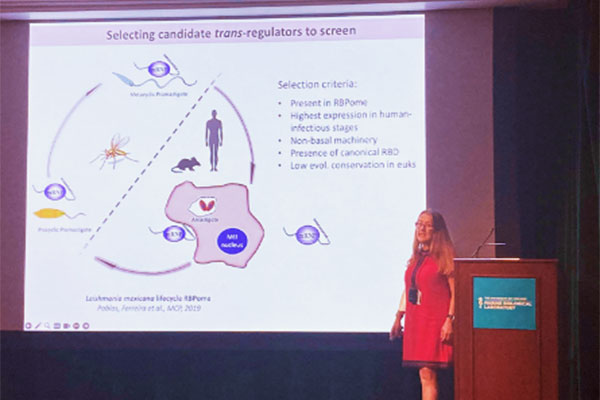
Pegine Walrad at Kinetoplastid Molecular Cellular Biology Meeting, MBL, 2024
Gene regulation is overwhelmingly post-transcriptional in Kinetoplastid parasites, making Leishmania a perfect model system for RNA:Protein interaction dynamics. We use and are expanding the foremost genetic tools to examine the impact of removing/increasing levels of trans-acting factors; including RBPs, RNAs, ncRNAs and modifying enzymes.
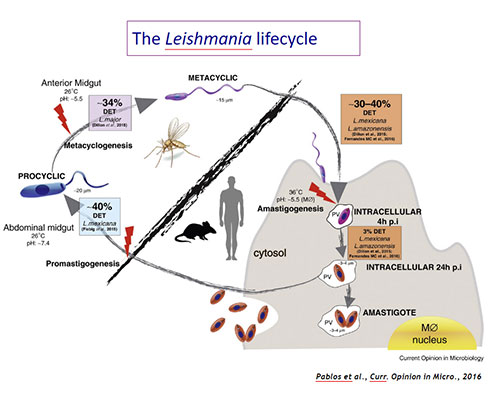
The Walrad lab has collaboratively identified a different RNA binding protein essential to parasite motility in tsetse flies and quantitatively determined the swimming behaviour of non- versus human-infective Leishmania (Findlay et al. 2021, Casas-Sanchez et al. unpublished). Our research revealed the first evidence of post-transcriptional epigenetic regulation in eukaryotes via PRMT enzymes and quantitatively identified the comprehensive RBPomes of L.mexicana and T.cruzi (Ferreira et al. 2020, Pablos et al. 2019, Viraque et al. unpublished). Ongoing research has screened and verified essential trans-regulators and is developing an mRNP interactome model of gene regulation key to lifecycle progression and virulence (Parry et al. unpublished). Current collaborations are verifying and characterising novel regulatory ncRNAs essential to Leishmania virulence and the impact of post-transcriptional modifications upon mRNP function and interaction dynamics.

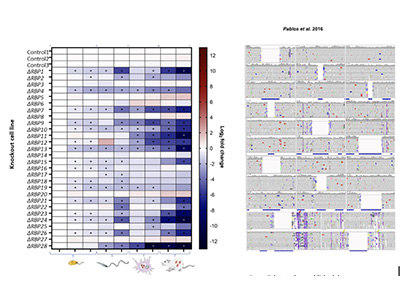
Research in the Walrad lab is supported by the Royal Society, UKRI (MRC, BBSRC), GCRF and Horizon Europe’s Global Health EDCTP3. Dr. Walrad has participated in 2 MRC Global Challenges Research Fund consortiums (>50 research institutes), The NTD Network having recently received the prestigious MRC Impact Award of 2024.
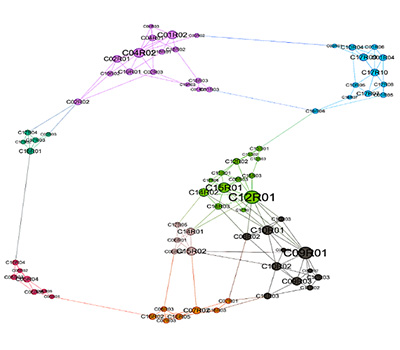
Teaching
Undergraduate
- 2022 - current: Module Organiser, Pathogens BIO00086H, Biology.
2019 - current: Instructor, Advanced Topics in Molecular Biology module BIO00071H,
Biology. - 2016 – current: Instructor, MPH Infection and Disease SPH00066M, Health Sciences.
Previous teaching
- 1st year:
2013 – 2020: Lecturer, Microbiology BIO00010C, Biology. - 2nd year:
2018 - 2023: Lecturer, Infection and Immunology BIO00050I, Biology. - 3rd year:
2014 – 2019: Module Organiser, Human Molecular Parasitology BIO00018H, Biology. - 2019 - 2022: Module Organiser, Spec. Topics in Infection and Immunology BIO00081H, Biology.
Other teaching
Since appointment as a 2013 Anniversary Research Lecturer, Dr. Walrad has promoted Pathogen Biology through research-led teaching at York in the Departments of Biology and Health Sciences. Teaching on 10 modules over 10 years with consistently high
Feedback, she has designed 6 modules to meet Programme and Departmental priorities and secured top external experts to deliver guest lectures. She integrates the latest research and techniques to enthuse and equip students with critical thought on current biological questions. In recognition of her approach and delivery, her teaching and supervision has been nominated for excellence awards 10 times by both YUSU and EUSA student organisations and she has received Department of Biology Teaching Excellence Commendations every year from 2016-24. She has recently undertaken an external examiner role for the University of Edinburgh’s Biological Sciences programme.
Dr Walrad is a Fellow of the Royal Society of Biology, an organisation dedicated to Biological Sciences education. She has hosted and mentored 28 BSc, 13 MSc and 6 PhD students, 6 PDRAs and 2 international Research Fellows. She currently leads the final year Pathogens module and lectures for the Infection and Disease and Advanced Molecular Biology modules at York. She has created and delivered 3 invited Parasite Genetics courses for international post-graduate students abroad. Locally, she has designed and brought "Good Bugs, Bad Bugs" and "Blood: our strong immune system" lectures, with hands-on experiments to over 200 primary school students. She has further delivered 2 Pint of Science pub lectures and one Soap Box Science lecture to ~100 members of the general public.
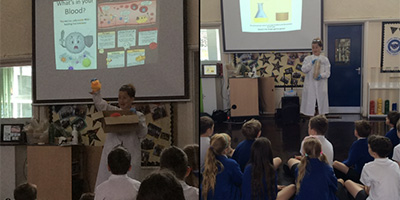
Publications
Full publications list
- Findlay, RC, Osman, M, Spence, K, Kaye, PM, PB Walrad#, LG Wilson#, 2021. Quantified, high speed, 3D imaging reveals chemotactic behaviour specific to human-infective Leishmania parasites. eLIFE. doi: 10.7554/eLife.65051.
- Ferreira, TR, Dowle, A, Parry, E, Alves-Ferreira, EV, Hogg, K, Plevin, MP, Cruz, AK. PB Walrad, 2020. PRMT7 regulates RNA-binding capacity and protein stability in Leishmania parasites. Nuc Acids Research. doi: 10.1093/nar/gkaa211.
- De Pablos, LM#, Ferreira, TR#, Dowle, A, Parry, E, Forrester, S, Newling, K, PB Walrad, 2019. The mRNA bound proteome of Leishmania mexicana: novel insight into an ancient parasite. Mol Cell Proteomics. 18(7) doi: 10.1074/mcp.RA118.001307.
- Carmichael, S, Hoare, T, Powell, B, PB Walrad#, J Pitchford#, 2021. Variable bites and dynamic populations; new insights in Leishmania transmission. PLoS NTD. doi: 10.1371/journal.pntd.0009033.
- Bühlmann, M#, Walrad, P#, Rico, E, Capewell, P, Arunasalam, N, Roditi, I, KR Matthews, 2015. TbNMD3 regulates mRNA via an XpoI-linked nuclear export mechanism. Nucleic Acids Res. 43(9) doi: 10.1093/nar/gkv330.
- Campagnaro, GD, Nay, E, Plevin, MJ, Cruz, AK, PB Walrad, 2021. Arginine Methyltransferases as Regulators of RNA Binding Protein Activities in Kinetoplastids. Front Mol Bioscience. doi: 10.3389/fmolb.2021.692668.
- Walrad PB#, Field MC#, Navarro M, Robinson DR#. 2021. Kinetoplastid cell biology and genetics, from the 2020 BSP Trypanosomiasis and Leishmaniasis symposium, Granada, Spain. Parasitology. doi: 10.1017/S0031182021000998.
- Dey NS, Senaratne S, Somaratne V, Madarasinghe NP, Seneviratne B, Forrester S, Montes de Oca M, Reis LC, Moulik S, Walrad PB, Chatterjee M, Goto H, Wickremasinghe R, Lagos D, Kaye PM, S. Ranasinghe, 2024. Early reduction in PD-L1 expression predicts faster treatment response in human cutaneous leishmaniasis. J Clin Invest. doi: 10.1172/JCI180162.
- Dey, N, Senarathna, S, Somaratne, V, Madarasinghe, N, Seneviratne, B, Reis, L, Moulik, S, Walrad, PB, Chatterjee, M, Goto, H, Wickremasinghe, R, Lagos, D, Kaye, PM, S. Ranasinghe, 2021. Reduced expression of PD-L1 and IDO1 characterises early response to antimonial therapy in cutaneous leishmaniasis patients. J Clin Invest. doi: 10.1101/2020.02.21.959528.
- Diniz, JA, Chaves, MM, Vaselek, S, Magalhães, RDM, Ricci-Azevedo, R; de Carvalho RVH. Lorenzon, LB, Zamboni, D, Walrad, PB, Volf, P, Sacks, DL, AK Cruz, 2021. Protein methyltransferase 7 deficiency increases neutrophil associated pathology in Leishmania major. PLoS NTD. doi: 10.1371/journal.pntd.0009230.
- Baker, N#, Catta-Preta, CMC#, Neish, R, Sadlova, J, Powell, B, Ferreira, E, Geoghegan, V, Carnielli, JBT, Newling, K, Hughes, C, Vojtkova, B, Anand, J, Mihut, A, Walrad, PB, Wilson, LG, Pitchford, J, Volf, P, JC Mottram, 2021. Genetic screen of the Leishmania kinome reveals genes essential for differentiation and host survival, Nature Comms. doi: 10.1101/2020.09.06.279091.
- Farthing, NE, Findlay, RC, Jikeli, JF, Walrad, PB, Bees, MA, LG Wilson, 2017. Simultaneous two-colour imaging in digital holographic microscopy, Opt. Express. 25(23), doi: 10.1364/OE.25.028489.
- Thornton KL, Findlay RC, Walrad PB, Wilson LG. 2016. Investigating the Swimming of Microbial Pathogens Using Digital Holography. Adv Exp Med Biol. 915:17-32. doi: 10.1007/978-3-319-32189-9_3.
- De Pablos, LM#, Ferreira, TR, PB Walrad, 2016. Developmental differentiation in Leishmania lifecycle progression: post-transcriptional control conducts the orchestra. Curr Opin in Microbiol. 23(34). doi: 10.1016/j.mib.2016.08.004.
- Ferreira TR, Alves-Ferreira EV, Defina TP, Walrad P, Papadopoulou B, AK Cruz, 2014. Altered expression of an RBP-associated arginine methyltransferase 7 in Leishmania major affects parasite infection. Mol Micro. doi:10.1111/mmi.12819.


